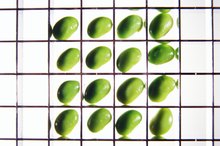Side Effects of Oil of Oregano
Herbalists prize oil of oregano, extracted from the leaves of Origanum vulgare, for its medicinal properties, including the ability to inhibit the growth of bacteria, fungi and viruses. It differs from the oregano most often used as a culinary spice, which comes from a related plant called Origanum majoricum. However, like many drugs and herbal remedies, oil of oregano can have side effects and may produce allergic reactions in those sensitive to this family of plants.
Allergic Reactions
Origanum vulgare, the source of oil of oregano, comes from the same plant family as basil, hyssop, marjoram, mint, sage and thyme. If you have experienced any adverse reactions to these plant materials in the past, avoid oil of oregano. Allergic reactions to oregano and any of its byproducts can manifest in a variety of ways, according to Charles W. Fetrow and Juan R. Avila, authors of “The Complete Guide to Herbal Medicines.” Symptoms may include facial swelling, skin rash, itching, and/or difficulty breathing, swallowing or speaking. If any of these symptoms should appear after using oil of oregano, discontinue its use immediately and consult your doctor.
Even without a true allergy to oregano or its byproducts, people with sensitive skin may develop signs of irritation when oil of oregano is applied topically. This problem usually can be addressed by diluting the oil of oregano with olive oil or some other essential oil that is soothing and less irritating to the skin.
- Origanum vulgare, the source of oil of oregano, comes from the same plant family as basil, hyssop, marjoram, mint, sage and thyme.
- Even without a true allergy to oregano or its byproducts, people with sensitive skin may develop signs of irritation when oil of oregano is applied topically.
Inhibits Iron Absorption
Side Effects of Frankincense Oil
Learn More
If you suffer from any form of iron deficiency, including iron-deficiency anemia, it’s important to know that oil of oregano can inhibit the body’s absorption of this important mineral. For this reason, Liliana Stadler Mitrea, a naturopathic doctor and author of “Natural Medicine Mosaic,” recommends that oil of oregano be used at least two hours before or after taking iron supplements. Because of the importance of iron during pregnancy, some doctors advise pregnant women to avoid oregano and its byproducts altogether during this critical period.
Possible Interactions
CAMline, an online database of information about complementary and alternative medicine, warns that oil of oregano may potentiate or amplify, the effects of certain medications. CAMline cites reports that oil of oregano has anticoagulant properties, suggesting at least in theory that its use in combination with anticoagulant medication could increase the effects of that medication, perhaps beyond desirable levels. Similar reactions have been observed when oregano derivatives are used with anti-diabetic medications and supplementary sources of hormones, such as birth control pills or hormone replacement therapy. CAMline emphasizes that more extensive studies will be needed to fully document the dangers, if any, of such interactions.
- CAMline, an online database of information about complementary and alternative medicine, warns that oil of oregano may potentiate or amplify, the effects of certain medications.
- CAMline cites reports that oil of oregano has anticoagulant properties, suggesting at least in theory that its use in combination with anticoagulant medication could increase the effects of that medication, perhaps beyond desirable levels.
Related Articles
References
- "The Complete Guide to Herbal Medicines"; Charles W. Fetrow, Juan R. Avila; 2000
- "Natural Medicine Mosaic"; Liliana Stadler Mitrea, MD (Eur), ND; 2007
- U.S. Department of Agriculture, Agricultural Research Service. FoodData Central, 2019.
- Therapeutic Research Center. Natural Medicines Comprehensive Database.
- Kubatka P, Kello M, Kajo K, et al. Oregano demonstrates distinct tumour-suppressive effects in the breast carcinoma model. Eur J Nutr. 2017;56(3):1303-1316. doi:10.1007/s00394-016-1181-5
- Force M, Sparks WS, Ronzio RA. Inhibition of enteric parasites by emulsified oil of oregano in vivo. Phytother Res. 2000;14(3):213-4.
- Ragi J, Pappert A, Rao B, Havkin-frenkel D, Milgraum S. Oregano extract ointment for wound healing: a randomized, double-blind, petrolatum-controlled study evaluating efficacy. J Drugs Dermatol. 2011;10(10):1168-72.
- Buckley MR, Terry PD, Kirkpatrick SS, et al. Dietary supplementation with Zyflamend poly-herbal extracts and fish oil inhibits intimal hyperplasia development following vascular intervention. Nutr Res. 2019;68:34-44. doi:10.1016/j.nutres.2019.06.001
- U.S. Department of Agriculture, Agricultural Research Service. FoodData Central, 2019.
- Rodriguez-Garcia, I., Silva-Espinoza, B. A., Ortega-Ramirez, L. A., Leyva, J. M., Siddiqui, M. W., Cruz-Valenzuela, M. R., … Ayala-Zavala, J. F. (2015). Oregano Essential Oil as an Antimicrobial and Antioxidant Additive in Food Products. Critical Reviews in Food Science and Nutrition, 56(10), 1717–1727. DOI: 10.1080/10408398.2013.800832.
- Vallverdú-Queralt, A., Regueiro, J., Martínez-Huélamo, M., Rinaldi Alvarenga, J. F., Leal, L. N., & Lamuela-Raventos, R. M. (2014). A comprehensive study on the phenolic profile of widely used culinary herbs and spices: Rosemary, thyme, oregano, cinnamon, cumin and bay. Food Chemistry, 154, 299–307. DOI: 10.1016/j.foodchem.2013.12.106.
Resources
Writer Bio
Don Amerman has spent his entire professional career in the editorial field. For many years he was an editor and writer for The Journal of Commerce. Since 1996 he has been freelancing full-time, writing for a large number of print and online publishers including Gale Group, Charles Scribner’s Sons, Greenwood Publishing, Rock Hill Works and others.









